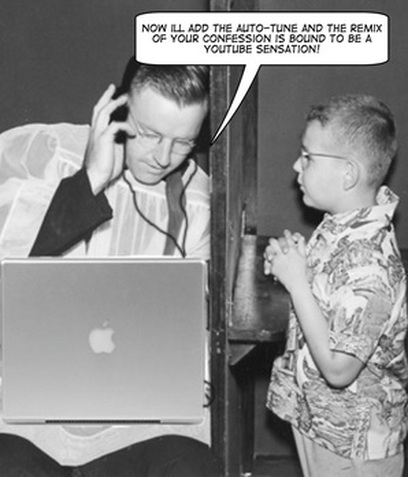Introduction
The human need to share one's life, as well as peek into the lives of others are by no means a new trend in society. Together they form a fundamental mechanism for individuals to establish social relationships and a sense of identity in relation to others. However, natural human curiosity and intercommunication has evolved into societal vigilance and diligent self-exposure in contemporary confessional culture. In my research I explore the influences and evolution of confessional culture in our society and argue that our confessional tendencies are perpetuated by contemporary media.
What is confessional culture anyway?
Our confessional culture is one in which we increasingly publicize the private and use the media to expose ourselves and others. It is one in which many of us post our feelings and opinions to blogs, and join social networks to share everything from pictures, our interests to our everyday micro-experiences, as well as to peek into the lives of online friends. It is an era where reality television reigns, and the average Joe can achieve fame by revealing his feelings to millions of television viewers.
So how has confessional culture become so prevalent in contemporary society?
Confessional tendencies have grown with the development mass communication technology, in the rise of celebrity culture, to television to the worldwide web. Confessional culture, Robert Thompson, a popular culture expert at Syracuse (N.Y.) University says confessional tendencies have been around since before Freud, but they took hold in America during the 1960s cultural revolution (the era of "let it all hang out"), and reappeared in afternoon TV talk shows and reality TV1. Confessional culture has been exacerbated with the recent proliferation of reality television and new digital media. Over the past two decades, reality TV has become an increasingly dominant component of contemporary television and established itself as a guilty pleasure many of us cannot help but indulge in to satisfy our voyeurism and vicarious living needs. Reality TV has given rise to a novel fascination with the lives and narratives of ordinary people and redefined the traditional definition of the celebrity. In addition, reality television has acted as a precursor for confessional tendencies in internet usage in the era of Web 2.0
Our confessional culture is one in which we increasingly publicize the private and use the media to expose ourselves and others. It is one in which many of us post our feelings and opinions to blogs, and join social networks to share everything from pictures, our interests to our everyday micro-experiences, as well as to peek into the lives of online friends. It is an era where reality television reigns, and the average Joe can achieve fame by revealing his feelings to millions of television viewers.
So how has confessional culture become so prevalent in contemporary society?
Confessional tendencies have grown with the development mass communication technology, in the rise of celebrity culture, to television to the worldwide web. Confessional culture, Robert Thompson, a popular culture expert at Syracuse (N.Y.) University says confessional tendencies have been around since before Freud, but they took hold in America during the 1960s cultural revolution (the era of "let it all hang out"), and reappeared in afternoon TV talk shows and reality TV1. Confessional culture has been exacerbated with the recent proliferation of reality television and new digital media. Over the past two decades, reality TV has become an increasingly dominant component of contemporary television and established itself as a guilty pleasure many of us cannot help but indulge in to satisfy our voyeurism and vicarious living needs. Reality TV has given rise to a novel fascination with the lives and narratives of ordinary people and redefined the traditional definition of the celebrity. In addition, reality television has acted as a precursor for confessional tendencies in internet usage in the era of Web 2.0

The “Web 2.0” era boasts a rise in blogs and social network sites that offer an increasingly growing number of Internet users easily accessible communication platforms to reach mass-scale audiences in a similar manner to reality TV made celebrities. Social network site users also participate in acts of non-directed self-disclosure to large amounts of people in the virtual community, and place emphasis in constructing and maintaining their online image and strive to build social capital through increasing their social network of “friends”. By increasing our “friends” we are increasing the exposure and visibility of the content and experiences we share with others. Today, many of use not only feel the need to explicitly share information and ritualistically narrate our lives with others, but to do so with an even larger group of people. This can be viewed as attention seeking and a form of self sensationalism, or as simply the new way we seek to establish our identity and communicate with others using the media in the height of our confessional culture.
This Website
The purpose of my research is to explore what has shaped this self-inflicted erosion of personal privacy and need to expose ourselves to others so prevalent in confessional culture today. We live in a society where it has become more and more normal to expose our lives to the world, through the rise of media revealing the “real” such as daytime talk shows and reality TV shows as well as a plethora of virtual means facilitating information sharing. In confessional culture we use the media to reveal ourselves, as well as the lives of others.
<< Previous back to top of page Next >>
1 Luspa, Cristian. “Confessional culture' draws a crowd” The Christian Science Monitor (2007).CSMonitor.com http://www.csmonitor.com/2007/0131/p13s02-algn.html

